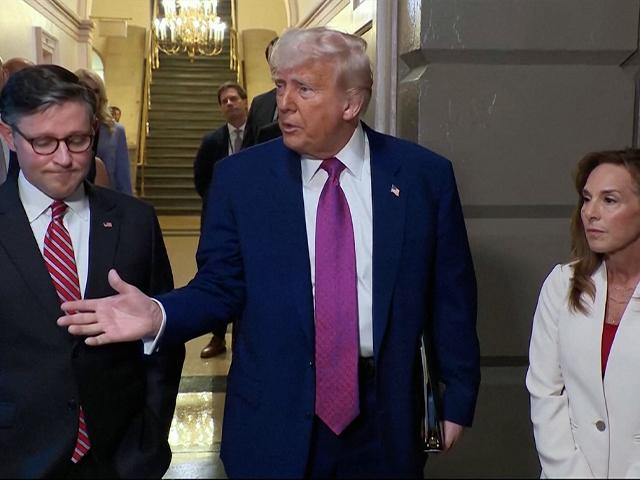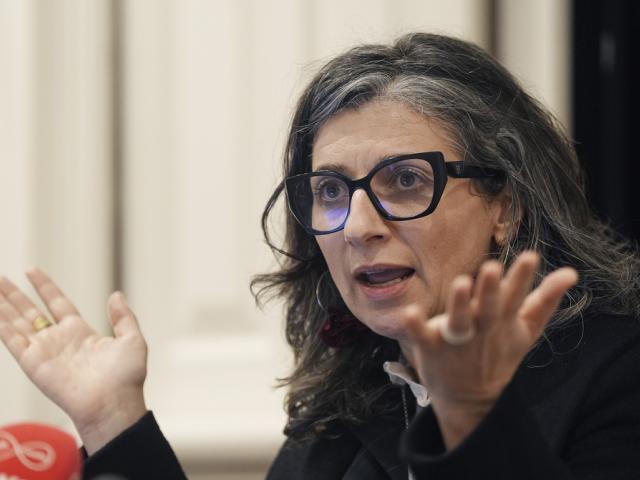WASHINGTON (AP) — The government inflation report being released Tuesday is expected to show that price acceleration in the United States remained chronically high in February, putting the Federal Reserve in an unusually tough position.
The Fed had been considered sure to raise its benchmark interest rate by at least a quarter-point when it meets next week. Many analysts even expected an aggressive half-point hike if Tuesday's report for February pointed again to elevated inflation. But that was before last weekend's two major bank failures and a series of emergency measures that the Fed unveiled to try to bolster confidence in the financial system.
With bank share prices cratering Monday and fears of further financial instability roiling markets, most economists now expect the Fed to pause its rate hikes next week to avoid causing any further instability at a delicate moment for the banking system.
At the same time, inflation continues to run far above what the Fed wants. Economists have estimated that Tuesday's report will show that consumer prices rose 0.4% from January to February, according to a survey of economists by the data provider FactSet. That would be slightly less than the increase from December to January but still too fast to be consistent with the Fed's 2% annual inflation target.
Economists have predicted that compared with a year ago, overall inflation rose 6% in February, down from a 6.4% year-over-year jump in January. They have also estimated that so-called core prices, which exclude volatile food and energy costs, rose 5.5% from a year earlier. That would be only slightly below January's annual pace of 5.6%.
Jan Hatzius, chief economist at Goldman Sachs, said Goldman now thinks the Fed's policymakers will pause their rate increases next week. Goldman had previously predicted a quarter-point hike. In a note to clients, Hatzius noted that the Fed, for now, appears even more focused on calming the banking sector and the financial markets than on fighting inflation.
“We would be surprised if, just one week after going to great lengths to support financial stability, policymakers risked undermining their efforts by raising interest rates again,” Hatzius wrote in a separate note Monday.
If the Fed does pause its rate hikes this month, Hatzius predicted, it will likely resume them when it next meets in May. Ultimately, he still expects the Fed to raise its key rate, which affects many consumer and business loans, to about 5.4% this year, up from the current 4.6%.
The Fed may get some unintentional help in its inflation fight from the aftereffects of the collapse of Silicon Valley Bank and New York-based Signature Bank. In response, many small and medium-size banks may pull back on lending to shore up their finances. A lower pace of lending could help cool the economy and slow inflation.
The possibility of a Fed pause underscores the sharp shift in the nation's financial system and economy in barely one week. Last Tuesday, Fed Chair Jerome Powell had told the Senate Banking Committee that if hiring and inflation continued to run hot, the Fed would likely raise rates at this month's meeting by a sizeable half-point. That would have marked a re-acceleration in the Fed's efforts to tighten credit. The central bank had raised its benchmark rate by a quarter-point in February, a half-point in December and by three-quarters of point four times before that.
The next day, testifying to a House committee, Powell cautioned that no final decision had been made about what the Fed would do at the March meeting. Still, on Friday, the government reported that employers added a robust 311,000 jobs last month. It was a potential sign of continued high inflation, and it led to predictions of a half-point hike at the Fed's meeting next week.
Later that day, though, Silicon Valley Bank failed, thrusting an entirely new set of co
WASHINGTON (AP) — The government inflation report being released Tuesday is expected to show that price acceleration in the United States remained chronically high in February, putting the Federal Reserve in an unusually tough position.
The Fed had been considered sure to raise its benchmark interest rate by at least a quarter-point when it meets next week. Many analysts even expected an aggressive half-point hike if Tuesday's report for February pointed again to elevated inflation. But that was before last weekend's two major bank failures and a series of emergency measures that the Fed unveiled to try to bolster confidence in the financial system.
With bank share prices cratering Monday and fears of further financial instability roiling markets, most economists now expect the Fed to pause its rate hikes next week to avoid causing any further instability at a delicate moment for the banking system.
At the same time, inflation continues to run far above what the Fed wants. Economists have estimated that Tuesday's report will show that consumer prices rose 0.4% from January to February, according to a survey of economists by the data provider FactSet. That would be slightly less than the increase from December to January but still too fast to be consistent with the Fed's 2% annual inflation target.
Economists have predicted that compared with a year ago, overall inflation rose 6% in February, down from a 6.4% year-over-year jump in January. They have also estimated that so-called core prices, which exclude volatile food and energy costs, rose 5.5% from a year earlier. That would be only slightly below January's annual pace of 5.6%.
Jan Hatzius, chief economist at Goldman Sachs, said Goldman now thinks the Fed's policymakers will pause their rate increases next week. Goldman had previously predicted a quarter-point hike. In a note to clients, Hatzius noted that the Fed, for now, appears even more focused on calming the banking sector and the financial markets than on fighting inflation.
“We would be surprised if, just one week after going to great lengths to support financial stability, policymakers risked undermining their efforts by raising interest rates again,” Hatzius wrote in a separate note Monday.
If the Fed does pause its rate hikes this month, Hatzius predicted, it will likely resume them when it next meets in May. Ultimately, he still expects the Fed to raise its key rate, which affects many consumer and business loans, to about 5.4% this year, up from the current 4.6%.
The Fed may get some unintentional help in its inflation fight from the aftereffects of the collapse of Silicon Valley Bank and New York-based Signature Bank. In response, many small and medium-size banks may pull back on lending to shore up their finances. A lower pace of lending could help cool the economy and slow inflation.
The possibility of a Fed pause underscores the sharp shift in the nation's financial system and economy in barely one week. Last Tuesday, Fed Chair Jerome Powell had told the Senate Banking Committee that if hiring and inflation continued to run hot, the Fed would likely raise rates at this month's meeting by a sizeable half-point. That would have marked a re-acceleration in the Fed's efforts to tighten credit. The central bank had raised its benchmark rate by a quarter-point in February, a half-point in December and by three-quarters of point four times before that.
The next day, testifying to a House committee, Powell cautioned that no final decision had been made about what the Fed would do at the March meeting. Still, on Friday, the government reported that employers added a robust 311,000 jobs last month. It was a potential sign of continued high inflation, and it led to predictions of a half-point hike at the Fed's meeting next week.
Later that day, though, Silicon Valley Bank failed, thrusting an entirely new set of co
WASHINGTON (AP) — The government inflation report being released Tuesday is expected to show that price acceleration in the United States remained chronically high in February, putting the Federal Reserve in an unusually tough position.
The Fed had been considered sure to raise its benchmark interest rate by at least a quarter-point when it meets next week. Many analysts even expected an aggressive half-point hike if Tuesday's report for February pointed again to elevated inflation. But that was before last weekend's two major bank failures and a series of emergency measures that the Fed unveiled to try to bolster confidence in the financial system.
With bank share prices cratering Monday and fears of further financial instability roiling markets, most economists now expect the Fed to pause its rate hikes next week to avoid causing any further instability at a delicate moment for the banking system.
At the same time, inflation continues to run far above what the Fed wants. Economists have estimated that Tuesday's report will show that consumer prices rose 0.4% from January to February, according to a survey of economists by the data provider FactSet. That would be slightly less than the increase from December to January but still too fast to be consistent with the Fed's 2% annual inflation target.
Economists have predicted that compared with a year ago, overall inflation rose 6% in February, down from a 6.4% year-over-year jump in January. They have also estimated that so-called core prices, which exclude volatile food and energy costs, rose 5.5% from a year earlier. That would be only slightly below January's annual pace of 5.6%.
Jan Hatzius, chief economist at Goldman Sachs, said Goldman now thinks the Fed's policymakers will pause their rate increases next week. Goldman had previously predicted a quarter-point hike. In a note to clients, Hatzius noted that the Fed, for now, appears even more focused on calming the banking sector and the financial markets than on fighting inflation.
“We would be surprised if, just one week after going to great lengths to support financial stability, policymakers risked undermining their efforts by raising interest rates again,” Hatzius wrote in a separate note Monday.
If the Fed does pause its rate hikes this month, Hatzius predicted, it will likely resume them when it next meets in May. Ultimately, he still expects the Fed to raise its key rate, which affects many consumer and business loans, to about 5.4% this year, up from the current 4.6%.
The Fed may get some unintentional help in its inflation fight from the aftereffects of the collapse of Silicon Valley Bank and New York-based Signature Bank. In response, many small and medium-size banks may pull back on lending to shore up their finances. A lower pace of lending could help cool the economy and slow inflation.
The possibility of a Fed pause underscores the sharp shift in the nation's financial system and economy in barely one week. Last Tuesday, Fed Chair Jerome Powell had told the Senate Banking Committee that if hiring and inflation continued to run hot, the Fed would likely raise rates at this month's meeting by a sizeable half-point. That would have marked a re-acceleration in the Fed's efforts to tighten credit. The central bank had raised its benchmark rate by a quarter-point in February, a half-point in December and by three-quarters of point four times before that.
The next day, testifying to a House committee, Powell cautioned that no final decision had been made about what the Fed would do at the March meeting. Still, on Friday, the government reported that employers added a robust 311,000 jobs last month. It was a potential sign of continued high inflation, and it led to predictions of a half-point hike at the Fed's meeting next week.
Later that day, though, Silicon Valley Bank failed, thrusting an entirely new set of concerns onto the Fed.
Did you know?
God is everywhere—even in the news. That’s why we view every news story through the lens of faith. We are committed to delivering quality independent Christian journalism you can trust. But it takes a lot of hard work, time, and money to do what we do. Help us continue to be a voice for truth in the media by supporting CBN News for as little as $1.










 Subscribe
Subscribe Follow
Follow CBN.com
CBN.com
 Support CBN News
Support CBN News







